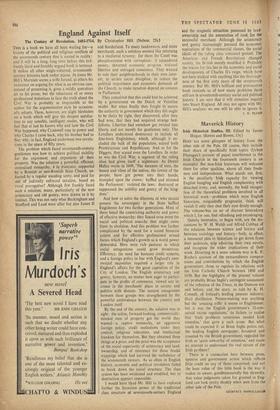England Against Itself
By Christopher Hill. (Nelson, 25s.) The Century of Revolution, 1603-1714.
THIS is a book we have all been waiting for—a history of the political and religious conflicts of the seventeenth century that is rooted in reality: and it will be a long, long time before this bril- liantly lucid and forcibly argued book is bettered It makes all other single-volumed, seventeenth- century histories look rather jejune. At times Mr. Hill's Marxism seems a trifle forced; at others his insistence on arguing for what is an obvious case, instead of presenting it, gives a mildly querulous air to his prose; but the reluctance of so many professional historians to face the truth about the Civil War is probably as responsible as the author for the argumentative style he occasion- ally adopts. These, however, are slight blemishes on a book which will give the deepest satisfac- tion to any sensible, intelligent reader, who will feel that at last he knows why and how the Civil War happened, why Cromwell rose to power and why Charles I came back, why his brother had to flee; why, in fact, England underwent two revolu- tions in the space of fifty years.
The problem which faced seventeenth-century gentlemen was how to achieve political stability for the enjoyment and expansion of their property. Was the solution a powerful, efficient, centralised monarchy, a la 1 rancaise, supported by a Romish or neo-Romish State Church, en- forced by a regular standing army, and paid for out of judicially enforced taxation, based on royal prerogative? Although few frankly faced such a solution, many, particularly of the new aristocracy and old gentry, were drawn to it by instinct. This was not only what Buckingham and Strafford and Laud were after but also James 11 and Sunderland. To many landowners, and more merchants, such a solution seemed like returning to a mediaeval tyranny: for them the Court was phosphorescent with corruption: it squandered money, thwarted economic progress, violated liberties and outraged conscience. They wanted to rule their neighbourhoods in their own inter- est; to secure social discipline; to reduce the political importance and economic demands of the Church; to make taxation depend on consent in Parliament.
They conceived that this could best be achieved by a government on the Dutch or Venetian model. But when finally they fought to secure the authority in government which they felt ought to be theirs by right, they discovered, after they had won, that they had acquired strange bed- fellows. Liberties had somehow got twisted into liberty and not merely for gentlemen only. The Levellers understood democracy to include all free-born Englishmen, which, although it ex- cluded the bulk of the population, scared both Presbyterians and Republicans. And as for the Diggers, they scared even the Levellers. In order to win the Civil War, a segment of the ruling class had given itself a nightmare. As Denzil Halles wrote in 1649, 'The meanest of men, the basest and vilest of the nation, the lowest of the people, have got power into their hands; trampled upon the crown: baffled and misused the Parliament: violated the laws: destroyed or suppressed the nobility and gentry of the king- dom.'
And how to solve the dilemma of who should possess the sovereignty in the State baffled Engishmen for two further generations. Most of them hated the constricting authority and power of effective monarchy; they feared even more the social and political anarchy that might come from its abolition. And this problem was further complicated by the need for a sound financial system and for effective professional armed forces which England's growth as a world power demanded. Here were rich pastures in which social antagonisms could grow monstrous. Efficiency, the need for buoyant credit systems, and a foreign policy in line with England's com- mercial necessities required a larger role in England's affairs for the great capitalists of the City of London. The English aristocracy and gentry, however, no matter how eager to partici- pate in the profits of commerce, viewed any in- crease in the merchants' place in society and politics with distaste. The natural antagonism between these groups was strengthened by the powerful ambivalence between the country and London itself.
By the end of the century, the solution was in sight : the active, forward-looking, commercially- minded men of property got the world they wanted—a captive monarchy, an aggressive foreign policy, credit institutions under their control, religious toleration, and intellectual freedom for themselves. But they obtained these things at a price, and the price was the acceptance of the social superiority of aristocracy and land- ownership. and of reverence for those feudal trappings which had survived the turbulence of the seventeenth century. As so often in English
history, economic and political revolution failed to break down the social structure. The class system has been weakened and modified, but its destruction appears impossible.
I would have liked Mr. Hill to have explored further the ferocious power of the traditional class structure of seventeenth-century England and the magnetic attraction possessed by land- ownership and the ostentation of rank for the successful merchant. Although the aristocracy and gentry increasingly pursued the economic aspirations of the commercial classes, the social ideals of the ruling class remained genteel. The American and French Revolutions changed society, the British merely modified it. Probably the reason for this lies in the economic and social developments of Charles ll's reign, which have not been studied with anything like the thorough- ness of the first sixty years of the seventeenth century. But Mr. Hill's brilliant and provocative book reminds us of how many problems there still are in seventeenth-century social and political history. I am sure that it will stimulate inquiry into Stuart England. All may not agree with Mr. Hill's analysis; no one will be able to ignore it.
3. H. PLUMB










































 Previous page
Previous page